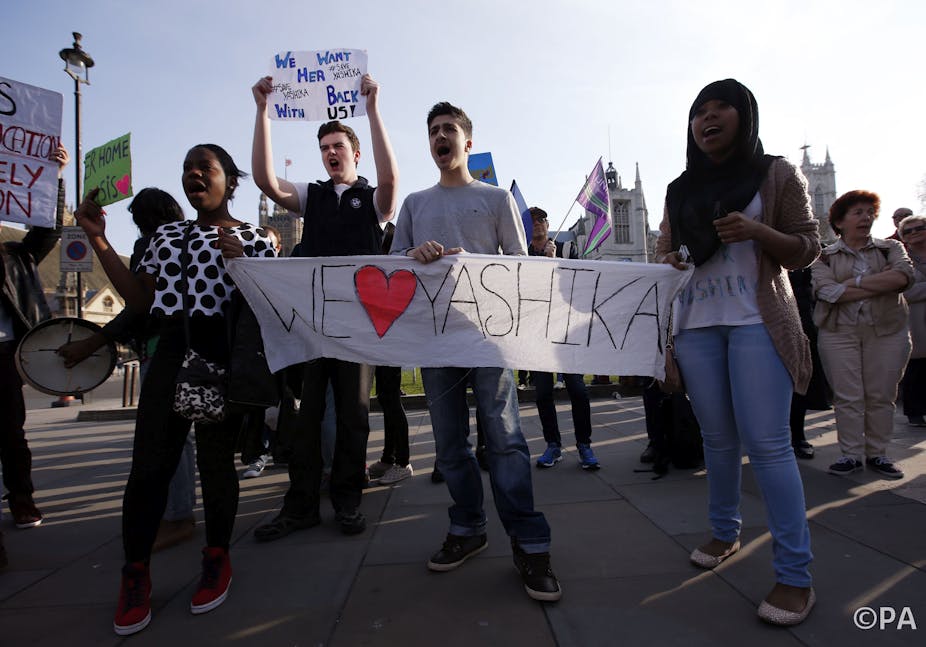In just a few days last week the #FightForYashika campaign managed to raise more than 178,000 signatures on a petition asking to the UK Home Office to reconsider the forced removal of 19-year-old Yashika Bageerathi, who was deported back to Mauritius to face the abuse and harrassment from which she and her family had claimed asylum in Britain in 2011. In a poignant analysis of the case in The Observer newspaper, Catherine Bennett, explained the possible reasons behind the sympathetic coverage even in usually anti-immigration media outlets by this story, noting that it “nicely encapsulates a picky but popular approach to migrants: just a few exceptionally gifted singletons, please”.
She also noted that this approach has a darker side – namely the exclusion of many more young migrants who have, like Yashika, applied unsuccessfully for asylum in the UK when still underage and whose stories receive far less sympathy and coverage in media. These children are, she wrote, “effectively punished by public opinion for being insufficiently picturesque” or not equally academically successful.
Individual stories such as Yashika’s have the power to mobilise sympathy beyond the usual pro-immigration camp and to reach out towards new constituencies – in this case also Conservative MP David Burrowes and the top model Cara Delevingne.
But if campaigns limit their scope to the individual case, and indeed make the case for a differential treatment based on it being exceptional, they produce little in terms of shifting public debate and changing the governance of youth immigration. Unfortunately, in this case, the petition did not even achieve its goal to postpone Yashika’s removal to after the completion of her A-levels.
But individual stories don’t necessarily need to be exceptional to mobilise widespread support. This has been demonstrated by the success of young undocumented migrants in the USA in changing the terms of the immigration debate. The DREAMers as the campaigners are known, created the political space in June 2012 for the US president, Barack Obama, to sign an executive order to suspend deportations and grant renewable two-year residence permits to young undocumented migrants (Deferred Action for Childhood Arrivals, DACA).
The DREAMers are a significant voice in the ongoing campaign for a long-term immigration reform that would regularise millions of undocumented young people who have developed strong social and emotional ties in the USA. Thanks to the persistent and well-organised work of the campaigners, many Americans perceive these young people as the contemporary embodiment of the American Dream. This is captured by the following statement on June 15, 2012, by President Obama:
These are young people who study in our schools, they play in our neighbourhoods, they are friends with our kids, they pledge allegiance to our flag. They are Americans in their heart, in their minds, in every single way but one: on paper.
Facing tomorrow alone
A report launched today by the Office of the Children’s Commissioner for England on unaccompanied children refused asylum helps place Yashika’s case in the broader picture. It does this by combining three elements: the voices of unaccompanied children who are at risk of becoming Appeal Rights Exhausted (ARE), the analysis of a rapidly changing legislative and policy landscape, and the views of lawyers, local authorities and support organisations.
In 2012, the United Kingdom was the fifth top destination country in Europe for unaccompanied asylum seeking children, with 1,125 applications. Around a quarter of these were successful in obtaining refugee status while the remainder had their claims refused outright or were granted limited leave to remain until age of seventeen and a half.
The uncertainty about the future that dominates the stories of unaccompanied minors is at the core of the report: “What’s going to happen tomorrow?”. The report highlights how current policy is narrowing the meaning of the principle of the “best interests of the child” enshrined in the UN Convention for the Right of the Child and in UK legislation. As a result, an increasing number of former unaccompanied asylum seeking children who are now young adults are left marginalised, disenfranchised and with little hope about their future.
The consequences of such an approach are not only felt by the young migrants. There are broader societal ramifications that policy makers to date have paid little attention to. Government figures show that only a small proportion of former unaccompanied minors refused asylum return voluntarily, with or without assistance, or have their removal enforced once they turn 18. Between 2010 and 2012, only 13.8% of the former unaccompanied children departed or were removed. The gap in the figures suggests that the majority of former unaccompanied children remain in the UK surviving on a day-to-day basis, vulnerable to exploitation and destitute.
The report of the Office of Children’s Commissioner for England reminds UK authorities of the paramount need and legal obligation to ensure that young people seeking asylum can properly put their case before the decision maker. The authorities also need to ensure the safety and well-being of those young people refused asylum – not least because, as the report warns: “a successful transition to adulthood not only favours young asylum seekers but is also in the interests of the state”.

